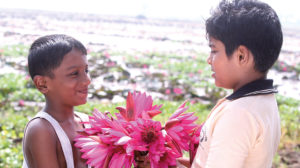 Award-winning Malayalam director Jayaraj turned to an Anton Chekov short story, “Vanka”, to find the inspiration for his most recent film Ottaal (“The Trap”), proof that some themes transcend place and time.
Award-winning Malayalam director Jayaraj turned to an Anton Chekov short story, “Vanka”, to find the inspiration for his most recent film Ottaal (“The Trap”), proof that some themes transcend place and time.
Eight-year-old Kuttappai (Ashanth K. Sha), orphaned after the death of his parents, is raised by his Vallyappachayi or grandfather (Kumarakaom Vasudevan, a fisherman in real life) in Kuttanad, in the backwaters of Kerala. Together they fish and raise ducks.
The film’s most moving moments aren’t grand and dramatic, but flow out of the relationship between grandfather and grandson. Pointing out a bird’s nest to his grandfather results in a lesson about bird migration, but when Kuttappai wants to know what happens to the little birds with no parents, his grandfather is unable to answer him. But Vallyappachayi is more certain about which night-time stars are Kuttappai’s parents, reassuring the boy that they surely can see him running and playing. Kuttappai’s parents, it turns out, committed suicide after realizing they would be unable to pay back their debts. Kuttappai was given the poisoned food they ate, but was lucky enough to survive.
Kuttappai is a curious and sensitive boy, asking questions about everything he sees around him, giving his share of food to a local dog, helping out his rich friend Tinku by delivering pupa and tadpoles to school, and showing him lotuses that his grandfather makes into necklaces for the boys. He wants to go to school. His grandfather wants to send him, but can’t fathom how to do such a thing, when their life is so nomadic, drifting up and down the backwaters with the ducks.
When Vallyappachayi falls ill, decisions must be made about what will happen to Kuttappai. Vallyappachayi asks Tinku’s family to take the boy in, and Tinku’s mother wonders if the boy could be a companion to Tinku, while also helping them out with their houseboat and home stay business, but her husband (who already finds the “duck boy” an unsuitable friend for his son) refuses, on the grounds that it could be considered child labour. He is, however, more concerned with what would happen to them, than what will happen to Kuttappai, though. When all options run out, Vallyappachayi has no choice but to give in to Mesthiri (Shine Tom Chacko), a local duck boss who thinks children like Kuttappai should be working anyway. Under the pretense of being sent to a faraway school, Kuttappai is sent to the neighbouring state of Tamil Nadu to work in a fireworks factory.

Ottaal manages to reveal the devastation of child labour without actually having to show much of it in the film – instead, director Jayaraj focuses on the relationship between grandfather and grandson, showing us that despite the loss of his parents, Kuttappai thrives with the love and care of his Vallyappachayi. The two share stories that Kuttappai reads from a book borrowed from Tinku, and Kuttappai loves both to tease his grandfather, and learn about the natural world of the backwaters from him. This loss, of a nurturing presence and the innocence of childhood, more than anything, underpins the emotional weight of the film and its message.
I’ve seen Ottaal several times since it was first released, and this is the first time I’ve reviewed it. The film packs such an emotional punch that I’ve been left speechless each time, and even now, I feel the inadequacy of words to describe the power of this film. So many moments stick with me: the look on Mesthiri’s face when Vallyappachayi asks him if Kuttappai will be well cared for; the uneasy look on Tinku’s mother’s face when told that Kuttappai is going away to school; Kuttappai twisting his grandfather’s moustache and giving him a kiss; Kuttappai’s joy at the thought of going away to learn, and his sorrow at leaving his beloved Vallyappachayi, his cries covered by the sound of his grandfather’s paddle hitting the water as he rows faster and faster in this unbearable moment of separation; Kuttappai’s letter to his Vallyappachayi, a desperate plea to be liberated from the trap he’s fallen into. For children like Kuttappai, learning how to live comes much too soon.










